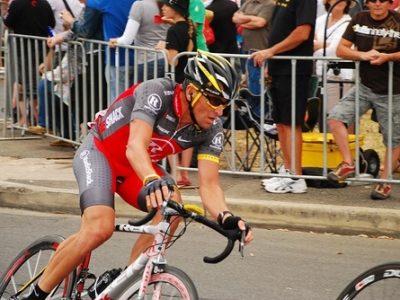You know the cyclists that zoom past your walking self on a daily basis on your walk to class, and wait until the very last possible second to veer away from a head-on collision? Well, there just might be more of them than usual this week because it is National Bike Week, which is a smaller portion of a month-long event that celebrates green, environment-friendly transportation and a healthful form of exercise.
Bike week events are typically more numerous in large metro areas like Los Angeles and Boston, who will hold festivals and cycling events for residents. People from professional cyclists to celebrities to ordinary Joes participate by riding their bikes to work or wherever else they need to go.
And as the weather warms up, it’s a perfect time to get on your bike or even watch it on a professional level. The famed Tour de France looms just over a month away, even though its popularity fell dramatically with the retirement of Lance Armstrong in 2011.
Simply put, no cyclist ever caught the imagination or the awe of the general public like Armstrong did. Much of the awe came from his inspiring road back to cycling success after suffering from cancer. After making immediate headways into the cycling world, he was diagnosed with Stage III testicular cancer, which ended up spreading all over his body. After intense surgery and chemotherapy, Armstrong’s cancer had subsided and he was back on the bike in 1998.
Although he won just two Tour de France stages before his cancer diagnosis, it was a far different story after his comeback. He won an unprecedented seven consecutive Tours from 1999 to 2005, making the European sport more relevant in the United States. After announcing his retirement at his peak of stardom in 2005, he would eventually make a Michael Jordan-esque comeback in 2009 and continue racing until 2011.

However, Armstrong’s legacy isn’t all cut and dry. Many professional cyclists and various other figures around him have alleged that he used steroids during his career, most notably when urine samples tested positive for the performance-enhancing drug erythropoietin. However, Armstrong refuted that claim. Today, it’s still a back-and-forth affair, as federal prosecutors dropped a recent investigation of Armstrong, while others continue to come forward with their viewpoints.
But Armstrong has made a legacy off the course as well, through his founding of the Lance Armstrong Foundation, or LIVESTRONG. The nonprofit organization is easily one of the most noticeable nationwide, and seeks to offer support for cancer patients and survivors, as well as funding for further cancer research.
“Everybody has a story about cancer, whether it’s yourself, brother, sister, mother, father, uncle, grandparents, somebody,”said Phil Hills, Livestrong’s executive vice president of development. “There aren’t many people in the world that haven’t been touched by cancer. And there are probably very few people of any type that have put as much into any fight as Lance has into the cancer realm.”



















